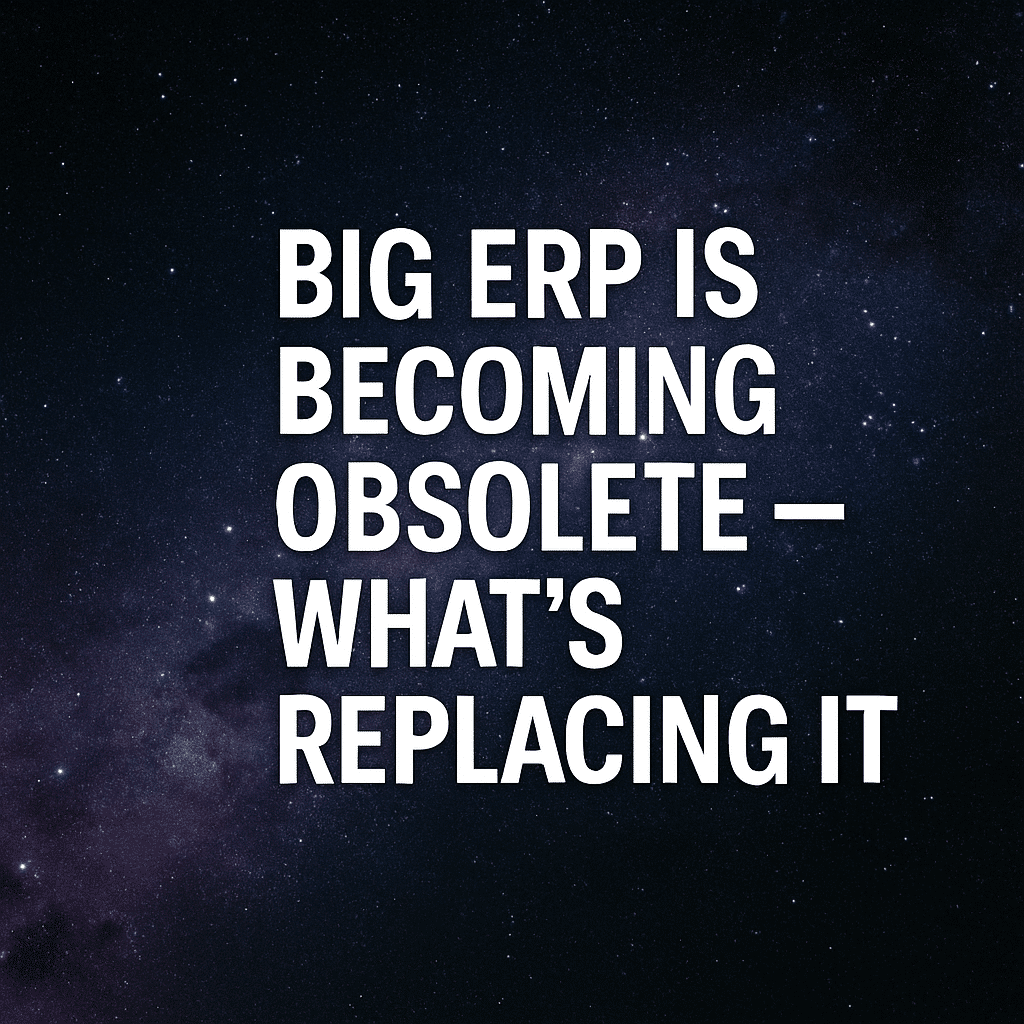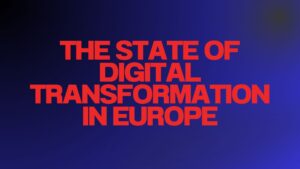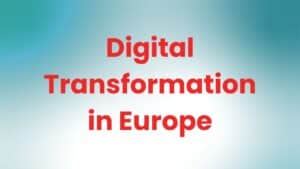For decades, monolithic ERP suites from vendors like SAP and Oracle promised a single system to run the business. But like Blockbuster ignoring Netflix or BlackBerry underestimating the iPhone, big ERP has missed where the market is headed. The category isn’t disappearing overnight—but its role is shrinking fast, and the operating model that surrounds it is being rebuilt.
This isn’t anti-ERP. It’s beyond ERP.
Table of Contents
ToggleWhy Big ERP Is Losing Ground
1) One vendor can’t keep up with the pace of change.
Vendors expanded to cover every function, industry, and workflow. In practice, that breadth created complexity, slower release cycles, and rigid roadmaps that don’t match how businesses evolve.
2) Lock-in economics work for vendors, not customers.
“Suite” strategies often integrate at the billing level more than the process level. The result is higher TCO, less optionality, and programs that consume EBITDA rather than contribute to it.
3) Best practice ≠ operating excellence.
Packaged processes are optimized for vendor scale, not your competitive edge. When your workflows must differentiate, templated processes become constraints.
4) AI raises the bar.
ERP databases remain essential systems of record—but they’re not systems of innovation. The value is shifting to AI-assisted, collaborative workflows that sit around the core, not inside a monolith.
The New Architecture: From ERP to Digital Enterprise Operations (DEO)
DEO is a platform mindset that keeps ERP for what it does best—clean transactions, compliance, a single version of truth—while moving innovation and collaboration to an agile layer above it.
Core elements of DEO:
- ERP as the stable ledger. Keep the system of record (financials, inventory, orders). Don’t rip-and-replace just to chase buzzwords.
- Interoperability hub (“mission control”). Normalize data from ERP and surrounding apps into a semantic layer (think: data lakehouse + APIs).
- Composable microservices & no/low-code apps. Decompose bulky workflows into targeted services that business users can adapt quickly.
- AI/Agentic layer. Use agents to assist knowledge workers on tasks like exceptions, scheduling, planning, testing, and analytics—without ceding control to a single vendor.
- Evergreen DevOps. Treat integrations, releases, and model updates as a product—not a project—so improvements land weekly, not yearly.
Decouple to Innovate: A Pragmatic Path
You don’t have to fight the elephant. Encapsulate it.
- Stabilize the core.
Freeze gratuitous customization, harden master data, and document critical processes. If you’re on ECC/JDE/other legacy and it’s stable, resist forced migrations until you have the right architecture. - Stand up the interoperability layer.
Use REST APIs and event streams to mirror ERP data into an analytics-ready store (e.g., BigQuery/Snowflake/Delta). Add a semantic model so the business speaks one language. - Move workflows, not just reports, to the edge.
Identify high-friction processes (transportation planning, warehouse flows, shop-floor interactions, approvals). Rebuild them as micro-apps that are collaborative by design. - Adopt “evergreen” delivery.
Small releases, automated testing, and platform-level governance. Aim for weekly changes with clear rollback paths. - Deploy AI where context is rich.
Start with narrow, high-context use cases: exception triage, schedule recommendations, demand signals, test generation, data quality checks. Keep humans in the driver’s seat; your agents are butlers, not bosses.
What About S/4HANA and Oracle Fusion?
Large suites will remain as transactional backbones for many organizations. But moving purely to “the next big ERP” rarely unlocks step-change business value on its own. If your legacy ERP is stable and customized for your reality, consider:
- Optionality over obligation. Don’t trade a perpetual license for a lifetime subscription unless the business case is explicit and strong.
- Edge-first modernization. Capture ROI by modernizing at the workflow edge (where the people are), then evolve the core on your timetable.
- No more mega-projects. Replace multi-year, big-bang upgrades with continuous capability releases mapped to measurable outcomes.
How AI Changes the Game (and the Risks)
- Productivity leap: AI-assisted development, testing, and decision support can 2–5x throughput for small teams.
- Model risk & lock-in: Be wary of “AI as a catch”—features that require deeper entanglement with the suite. Guard your data rights, portability, and IP.
- Governance: Treat prompts, policies, and deployment as first-class assets. Build a lightweight AI risk framework covering privacy, security, explainability, and vendor terms.
Vendor & SI Dynamics Are Shifting
The future is less about giant armies and more about small, senior teams who can both advise and build. Look for partners who:
- Embrace customer intimacy over market-cap theater
- Are tool-agnostic and interoperability-first
- Can stand up data pipelines, micro-apps, and AI safely—while leaving you with maintainable code and skills
A 90-Day Action Plan
Days 0–30: Discover & De-risk
- Map your top 10 value-streams and pain points
- Inventory data sources and integration points; assess ERP stability
- Define AI guardrails (privacy, IP, vendor terms)
Days 31–60: Build the Foundation
- Stand up a basic data platform + semantic layer
- Pilot two micro-apps (e.g., TMS exception handling, warehouse putaway)
- Implement automated testing & release pipelines
Days 61–90: Prove Value & Scale
- Add a targeted AI assistant (exceptions or planning)
- Measure cycle time, error rates, working capital impacts
- Create a 12-month backlog of edge capabilities; plan the core ERP roadmap last
The Bottom Line
ERP isn’t dying; the monolithic ERP mindset is. Keep ERP for clean records and compliance. Put innovation where it belongs—at the edge, in interoperable services, with AI that augments people. That’s how you lower risk, increase speed, and convert technology spend into EBITDA.
Questions to Consider
- Where is ERP truly creating value for us—and where is it slowing us down?
- What quick wins could an interoperability hub deliver in 90 days?
- Which 2–3 workflows are perfect to re-platform as micro-apps this quarter?
- How will we protect our data and IP as vendors bundle AI?
Keep Going
Download our Digital Transformation Report for independent software reviews, market trends, and practical playbooks you can use with your team today.
And if you want to go deeper with peers and our team:
The Executive Mastermind
An exclusive peer network of transformation leaders collaborating on strategy and innovation.
Learn more: thirdstage-consulting.com/the-executive-mastermind
— Eric Kimberling, CEO, Third Stage Consulting






